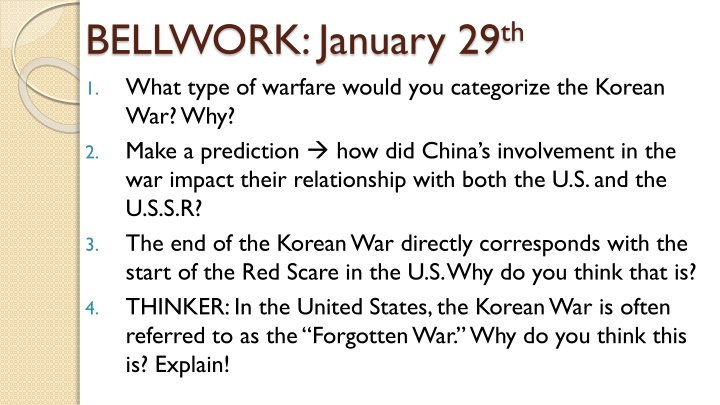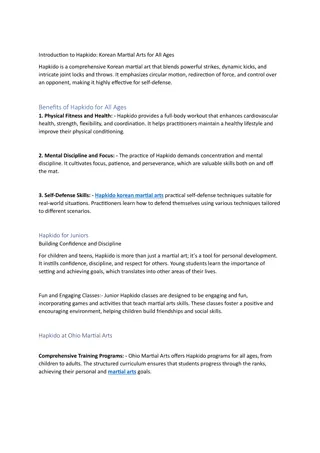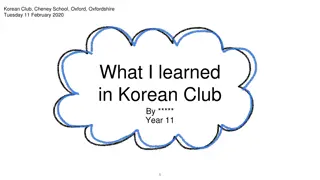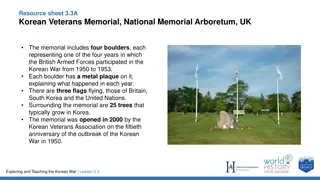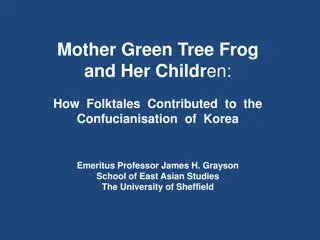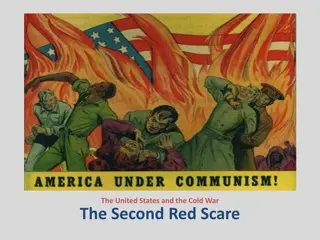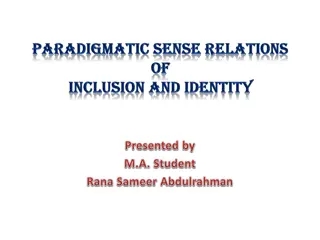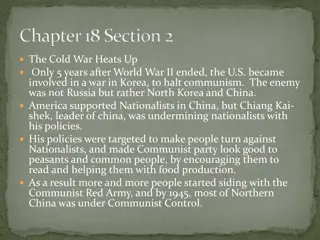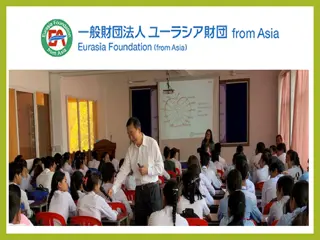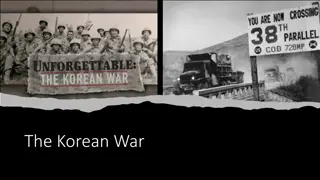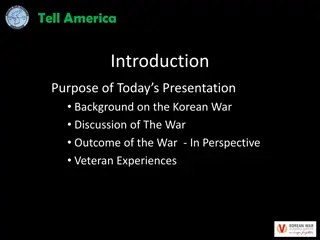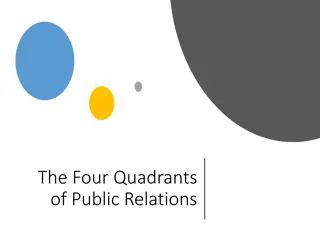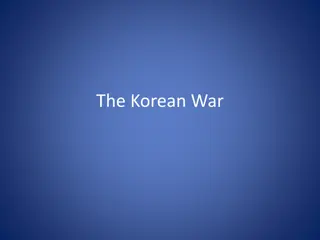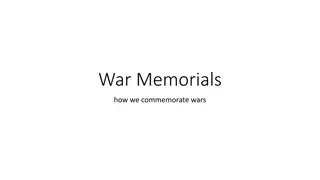The Impact of the Korean War on Global Relations
The Korean War, often dubbed the "Forgotten War," had significant implications on global politics and relationships. This conflict was characterized by a mix of conventional and guerilla warfare tactics. China's involvement in the war had a profound impact on its relations with the U.S. and the U.S.S.R., altering the dynamics of the Cold War. The end of the Korean War coinciding with the onset of the Red Scare in the U.S. highlights the interconnectedness of international conflicts and domestic fears. The war's importance in the development of the Cold War cannot be understated, as it shaped alliances and power dynamics during a critical period in history.
Download Presentation

Please find below an Image/Link to download the presentation.
The content on the website is provided AS IS for your information and personal use only. It may not be sold, licensed, or shared on other websites without obtaining consent from the author.If you encounter any issues during the download, it is possible that the publisher has removed the file from their server.
You are allowed to download the files provided on this website for personal or commercial use, subject to the condition that they are used lawfully. All files are the property of their respective owners.
The content on the website is provided AS IS for your information and personal use only. It may not be sold, licensed, or shared on other websites without obtaining consent from the author.
E N D
Presentation Transcript
BELLWORK: January 29th What type of warfare would you categorize the Korean War? Why? Make a prediction how did China s involvement in the war impact their relationship with both the U.S. and the U.S.S.R? The end of the Korean War directly corresponds with the start of the Red Scare in the U.S. Why do you think that is? THINKER: In the United States, the Korean War is often referred to as the Forgotten War. Why do you think this is? Explain! 1. 2. 3. 4.
The Korean War A Study of Perspectives US: Unknown/Forgotten War North Korea: Fatherland Liberation War South Korea: 625 Upheaval China: The War to Resist US Aggression Russia: Korean Conflict http://nationalmall.org/sites/default/files/files/Memorial%20in%20snow%202006%3B%20Lib%20of%20Congress%3B%20Carol%20M_%20Highsmith.jpg Korean War Memorial in Washington D.C.
The Korean War A Study of Perspectives For tomorrow, read the Korean War chapter from the textbook History Lessons: How Textbooks Around the World Portray U.S. History. This chapter focuses on how the war is taught in North Korea South Korea Great Britain Russia Canada Japan As you read this chapter, annotate & take notes on the different interpretations of the war. Be ready to discuss your findings on value, limitation, and position you agree with.
20th Century Battlefields: Korea Focuses on the fighting strategies, weapons, strengths and weaknesses of the combatants. Also highlights two key operations The amphibious landing at Inchon Battle for Imjin River Take notes on the worksheet (20 points!)
BELLWORK: January 30th 1. Which perspective do you agree with the most? (i.e. most valuable to our understanding of the war) Why? 2. Which perspective do you agree with the least? (i.e. most limitations/biases) Why? 3. THINKER: Why is the Korean War important in the development of the Cold War?
Which perspective do you agree/disagree with the most? NORTH KOREA SOUTH KOREA GREAT BRITAIN RUSSIA CANADA JAPAN
Effects of the Korean War Notes CHINA UNITED NATIONS COLD WAR NORTH/SOUTH KOREA SOVIET UNION UNITED STATES
Homework: due Tuesday 2/4! Next week, we will study the Non-Aligned Movement. This movement was a cooperative effort by new countries in Africa and Asia to create an alternative to the eastern/western blocs. Homework will be done in two parts: 1. Read/annotate pages 84-87 2. Research one country that joined this movement (not Egypt or Cuba!). As you research, describe the following in your notes: Why they joined the Non-Aligned Movement (goals??) Advantages of this country being apart of the movement Whether or not there was a relationship with the PRC, USSR, or U.S. How the Cold War impacted this country
Video: The Secret State of North Korea As you know, the outcome of the Korean War continues to impact the relationship between North Korea and the Western world. You will now watch a PBS/Frontline documentary, The Secret State of North Korea. The film uses undercover footage from inside the country as well as interviews with defectors Pay attention! Be ready to discuss! http://www.pbs.org/video/2365155890/
https://www.cnn.com/style/article/ryugyon g-hotel-architecture-origins/index.html Story about hotel in N Korea largest hotel in the world but never opened .
Homework: due Tuesday 2/4! Next week, we will study the Non-Aligned Movement. This movement was a cooperative effort by new countries in Africa and Asia to create an alternative to the eastern/western blocs. Homework will be done in two parts: 1. Read/annotate pages 84-87 2. Research one country that joined this movement (not Egypt or Cuba!). As you research, describe the following in your notes: Why they joined the Non-Aligned Movement (goals??) Advantages of this country being apart of the movement Whether or not there was a relationship with the PRC, USSR, or U.S. How the Cold War impacted this country
OLD BW (w/ effects of KW handout) 1. What type of warfare would you categorize the Korean War? Why? How did China s involvement in the war impact their relationship with both the U.S. and the U.S.S.R? How did the Korean War lead to political change in the US? How did the Korean War impact the arms race? Give examples! How did the Korean War impact alliances? Why is the Korean War important in the development of the Cold War? THINKER: In the United States, the Korean War is often referred to as the Forgotten War. Why do you think this is? 2. 3. 4. 5. 6. 7.
OLD BW In IB, it is extremely important to look at events from multiple perspectives. Today s lesson will focus on how countries around the world teach the Korean War. Today, you will read excerpts from the book History Lessons: How Textbooks from Around the World Portray U.S. History. For bellwork, read the introduction and respond to the following: Why do other countries learn so much U.S. history, while U.S. citizens seem to know relatively little about other countries? How do U.S. history textbooks compare with other countries? Do you like the U.S. method or is there a better alternative? What is comparative history? Why is this an effective way to study historical events? THINKER: In the United States, the Korean War is often referred to as the Forgotten War. Why do you think this is? 1. 2. 3. 4.
